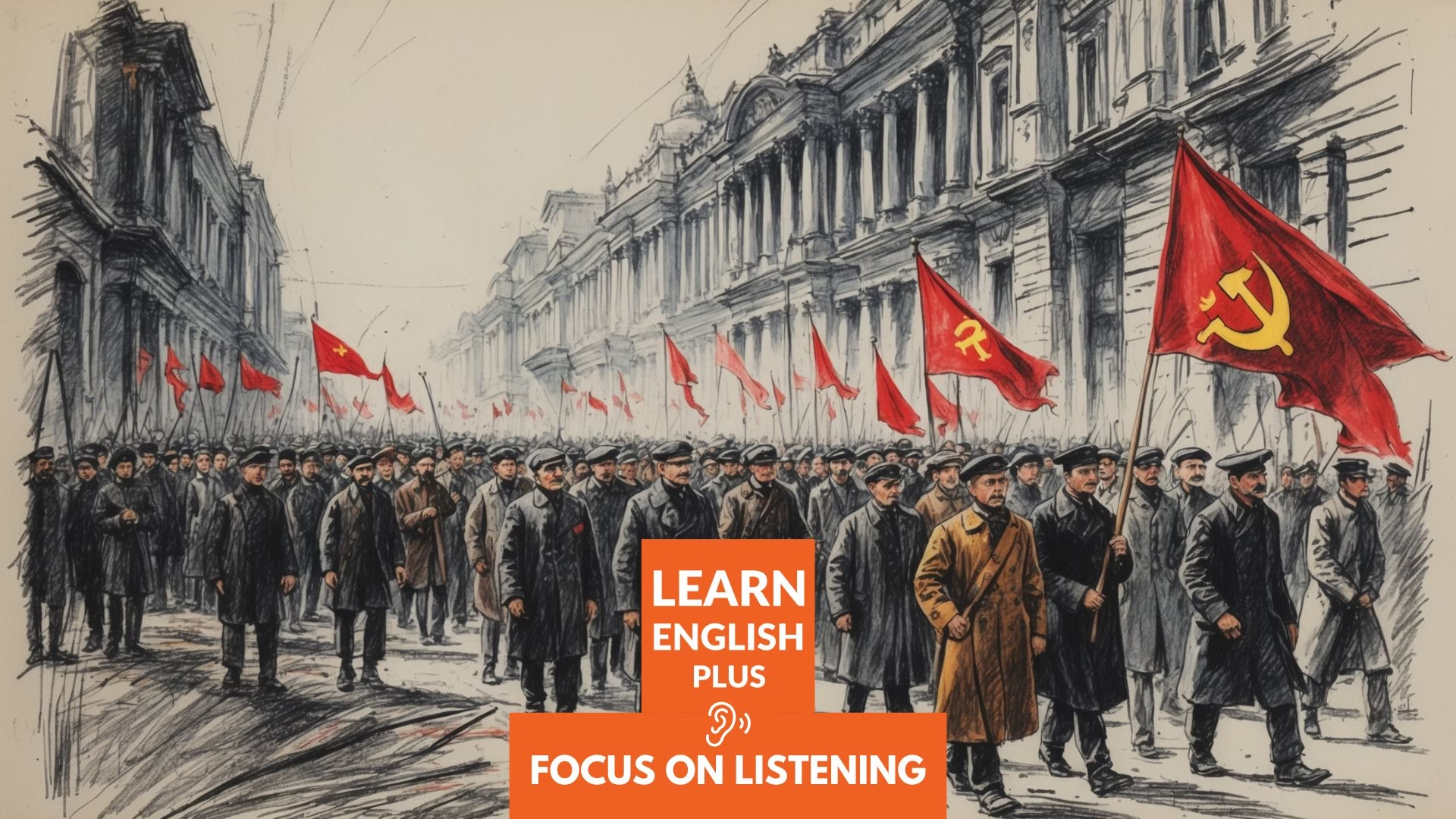Welcome back to our listening practice program! Today, we’re going to journey back in time to explore one of the most transformative events in modern history: the Russian Revolution. Understanding historical events and their complexities is a valuable skill, not just for international exams but also for gaining a broader perspective on the world. This listening exercise will help you practice following a narrative, understanding cause and effect, and identifying key figures and events.
Before we listen to the script, let’s quickly review some effective listening strategies for historical topics:
- Identify Key Players: Pay attention to the names of important individuals and their roles in the events.
- Follow the Timeline: Try to understand the chronological order of events as they are presented.
- Note Causes and Consequences: Listen for the reasons behind the events and their resulting impact.
- Contextualize Information: Try to relate the information to broader historical periods or themes you might already be familiar with.
- Listen for Different Perspectives: Sometimes historical accounts might present different viewpoints or interpretations. Be aware of these nuances.
Now, are you ready to delve into the history of the Russian Revolution? Let’s listen carefully!
Listening Script: Please don’t read the transcript before you listen and take the quiz.
The Russian Revolution, a period of immense social and political upheaval, fundamentally altered the course of Russian history and had a profound impact on the 20th century. It wasn’t a single event but rather a series of revolutions in 1917 that dismantled the Tsarist autocracy and led to the establishment of the world’s first communist state. To understand this pivotal moment, we need to examine the long-term and short-term factors that contributed to its eruption.
For centuries, Russia was ruled by an autocratic Tsar, whose power was absolute and unchecked. This system of governance created widespread discontent among the populace. The vast majority of the population were peasants living in poverty, with limited land and facing harsh living conditions. Industrialization in the late 19th and early 20th centuries led to the growth of a working class in urban centers, who also faced exploitation and poor working conditions. This social stratification, with a privileged elite and an impoverished majority, created a fertile ground for revolutionary ideas to take root.
The reign of Tsar Nicholas II in the early 20th century further exacerbated these tensions. His leadership was perceived as weak and ineffective, particularly during times of crisis. Russia’s humiliating defeat in the Russo-Japanese War of 1905 and the subsequent economic hardship fueled public anger. The Bloody Sunday massacre in the same year, where peaceful protesters were shot by the Tsar’s troops, further eroded public trust in the regime. These events led to the 1905 Revolution, which resulted in some limited reforms, including the establishment of a Duma, an elected assembly. However, the Tsar retained significant power, and the underlying social and economic issues remained largely unresolved.
The First World War proved to be the final catalyst for the revolution. Russia’s involvement in the war was disastrous. The country suffered immense casualties, and the war effort severely strained the already fragile economy. Food shortages became rampant in the cities, leading to widespread hunger and discontent. The Tsar’s decision to take personal command of the army in 1915, despite his lack of military expertise, further damaged his authority and was seen as a grave mistake.
By February 1917, the situation had reached a boiling point. A series of strikes and protests erupted in Petrograd (now St. Petersburg), fueled by food shortages and war weariness. The army, which was called in to quell the unrest, began to mutiny and side with the protesters. Faced with widespread rebellion and the loss of support from the military, Tsar Nicholas II was forced to abdicate the throne in March 1917. This marked the end of the Romanov dynasty, which had ruled Russia for over 300 years.
Following the Tsar’s abdication, a Provisional Government was formed, composed primarily of liberal and moderate socialist politicians. However, this government faced numerous challenges. It continued Russia’s involvement in the unpopular war, failed to address the pressing issue of land reform for the peasants, and struggled to maintain order amidst growing social unrest.
Meanwhile, a more radical socialist group, the Bolsheviks, led by Vladimir Lenin, gained increasing influence. The Bolsheviks advocated for an immediate end to the war, the redistribution of land to the peasants, and the transfer of power to the soviets – councils of workers, soldiers, and peasants. Lenin, who had been in exile, returned to Russia in April 1917 and articulated his “April Theses,” which called for a socialist revolution.
The Bolsheviks’ message resonated with many disillusioned workers and soldiers, and their support grew rapidly. In October 1917 (November according to the Gregorian calendar), the Bolsheviks launched a coup d’état, seizing control of key government buildings and infrastructure in Petrograd. The Provisional Government was overthrown, and the Bolsheviks established a Soviet government.
The October Revolution, as it became known, was a pivotal moment in history. It led to a bloody civil war between the Bolshevik “Reds” and their opponents, the “Whites,” who were supported by several foreign powers. After years of brutal fighting, the Bolsheviks emerged victorious, and in 1922, the Union of Soviet Socialist Republics (USSR) was officially formed.
The Russian Revolution had far-reaching consequences. It led to the establishment of a communist regime that lasted for nearly 70 years and inspired communist movements around the world. It also resulted in significant social and economic changes within Russia, including the nationalization of industries and land redistribution. The revolution marked the end of the Tsarist era and ushered in a new era of Soviet rule, fundamentally reshaping the political landscape of the 20th century. Understanding the complexities of this historical period is crucial for comprehending the world we live in today.
Glossary
- Immense social and political upheaval: A period of great and sudden change and disorder in society and government. Usage in the script: “The Russian Revolution, a period of immense social and political upheaval…”
- Dismantled the Tsarist autocracy: Took apart or destroyed the system of government where the Tsar had absolute power. Usage in the script: “…dismantled the Tsarist autocracy…”
- Pivotal moment: A very important point in time, especially one at which something changes. Usage in the script: “To understand this pivotal moment…”
- Eruption: A sudden outbreak or occurrence, often violent. Usage in the script: “…contributed to its eruption.”
- Autocratic Tsar: A ruler with absolute power. Usage in the script: “For centuries, Russia was ruled by an autocratic Tsar…”
- Widespread discontent: A general feeling of dissatisfaction among a large number of people. Usage in the script: “This system of governance created widespread discontent among the populace.”
- Social stratification: The division of society into different levels or classes. Usage in the script: “This social stratification…”
- Fertile ground for revolutionary ideas: A situation or environment in which new and radical ideas are likely to develop and be accepted. Usage in the script: “…created a fertile ground for revolutionary ideas to take root.”
- Exacerbated these tensions: Made already bad feelings or situations worse. Usage in the script: “The reign of Tsar Nicholas II in the early 20th century further exacerbated these tensions.”
- Humiliating defeat: A loss that causes someone to feel very ashamed and foolish. Usage in the script: “Russia’s humiliating defeat in the Russo-Japanese War of 1905…”
- Eroded public trust: Gradually destroyed the confidence and faith of the public. Usage in the script: “…further eroded public trust in the regime.”
- Fragile economy: An economy that is easily damaged or likely to fail. Usage in the script: “…severely strained the already fragile economy.”
- Boiling point: The point at which something becomes critical and likely to erupt. Usage in the script: “By February 1917, the situation had reached a boiling point.”
- Quell the unrest: To put an end to a disturbance or rebellion, typically by the use of force. Usage in the script: “The army, which was called in to quell the unrest…”
- Abdicate the throne: To formally give up a royal position or power. Usage in the script: “Tsar Nicholas II was forced to abdicate the throne…”
- Coup d’état: A sudden and illegal seizure of power from a government, often involving violence. Usage in the script: “…the Bolsheviks launched a coup d’état…”
- Far-reaching consequences: Having a wide and significant impact. Usage in the script: “The Russian Revolution had far-reaching consequences.”
- Ushered in a new era: Marked the beginning of a new period in history. Usage in the script: “…and ushered in a new era of Soviet rule…”










0 Comments